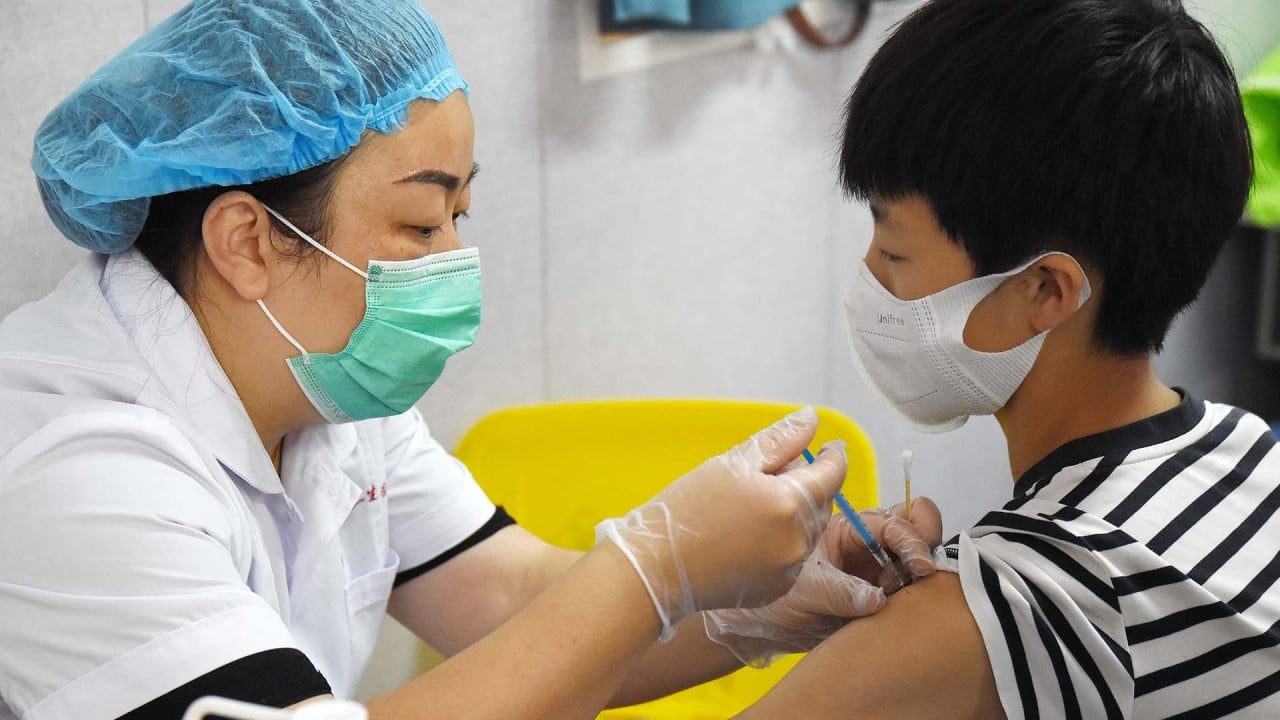
Coronavirus: Hong Kong opening walk-in vaccinations to students aged 12 and older on Friday
- The plan will see about 200 slots made available each day at more than 20 inoculation centres in bid to push jabs ahead of new school year
- City confirms five new imported Covid-19 cases involving arrivals from the Philippines, United Arab Emirates, France and Pakistan
The arrangement was unveiled on Wednesday as infectious disease experts, including government pandemic adviser Professor Yuen Kwok-yung, said the city’s “zero case” strategy and living with the virus were not mutually exclusive, while urging the public to get jabbed while infections remained low.
“As the summer holiday is coming to an end, we hope this arrangement will assist students and parents who have not yet been vaccinated [in doing so],” a government spokesman said.
The city confirmed five new imported Covid-19 case, involving arrivals from the Philippines, United Arab Emirates, France and Pakistan, taking the overall tally to 12,074, with 212 related deaths.
The Centre for Health Protection, meanwhile, also issued a mandatory testing notice for residents and recent visitors of Wing Cheung House in Sha Tin’s Sui Wo Court.
The move followed notification by British authorities that a 42-year-old woman living in the building during her incubation period had tested positive after arriving in Britain on August 16.
Hong Kong’s vaccination rate for the 12 to 19 age group is currently about 54 per cent, lower than the 65 to 75 per cent rate for those 20 to 59.
Coronavirus: 7 new imported cases; Hong Kong teens next in line for walk-in jabs
Students aged between 12 and 17 are only eligible for the BioNTech vaccine, while those aged 18 and up can also choose the Sinovac version, produced in mainland China.
The walk-in scheme was first rolled out last month for those aged 70 or older, with the age threshold being lowered to 60 about two weeks later.
Similar to arrangements for the elderly, the same-day tickets for students will be distributed daily from 7.45am on a first-come, first-served basis. They can obtain the ticket by presenting their Hong Kong identity cards, or authorising their family members or carers to collect it for them.
About 4,600 tickets will be distributed daily at the 24 designated centres, with 100 available each day at Tung Chung Community Hall and Hong Kong International Airport and 200 at each of the other locations.
People aged between 12 and 17 must also bring along a consent form signed by their parents.
Dr Ho Pak-leung, the University of Hong Kong’s (HKU) top microbiologist, said the walk-in service for students would be “a bit of help” but urged “creative” incentives to target those age groups slow to get inoculated.
He suggested special help for young people to buy tickets to concerts, plays and water parks for example.
“The target is very clear … it’s full vaccination, or 100 per cent for those age groups that are recommended for vaccination,” Ho said.
During a Legislative Council meeting on Wednesday, health minister Sophia Chan Siu-chee said that 83 per cent of staff at government schools had received the first dose of a vaccine as of mid-August.
When including other types of schools, the figure was about 47 per cent as of mid-July and 70 per cent when including those who planned to get jabbed.
She also gave an update on the inoculation rates of some target groups, saying about 95 per cent of doctors under the Hospital Authority had received at least one dose as of the middle of this month. The figure was 88 per cent for civil servants and 70 per cent for care home workers.
Does ‘game-changer’ Delta mean game over for ‘zero Covid’ in the Asia-Pacific?
Separately, in an opinion piece published in the Chinese-language daily Ming Pao, Yuen, along with HKU colleagues Dr David Lung and Dr Kelvin Chiu Hei-yeung, said anti-pandemic strategies needed to move with the times.
“We need to use different strategies to cope with different stages of a pandemic, and therefore [pursuing] zero infections and coexisting with the virus is not a contradiction,” they said.
“The aim of zero infections was not to eradicate Covid-19, but to gain time to vaccinate everyone. When [nearby] foreign countries are unable to achieve zero infections, it will also be difficult for Hong Kong to maintain zero infections for a long time.”
They warned that Sars-CoV-2, the virus that causes Covid-19, would not disappear in a few months, as the severe acute respiratory syndrome did in 2003.

01:45
China administers nearly 2 billion Covid-19 vaccine doses as Delta variant appears under control
But the latest coronavirus would also be more like previous ones that humans had learned to live with after reaching appropriate protection levels in the community, they said.
While scientists at first expected the pandemic could be brought under control by December, the emergence of the more transmissive Delta variant meant that public authorities around the world would need to reassess their strategies, according to the trio.
“The emergence of variants showed that the first-generation vaccine was not perfect enough and the hope of herd immunity has shattered,” they said.
Hong Kong school urges rethink of requirements for resuming full-day classes
People joining large gatherings or occasions where masks were not worn, such as banquets, gym workouts or singing and dancing sessions, would need to present proof of vaccination.
Strategies for coexisting with the virus could be further discussed when most of the city’s population had been vaccinated, they said.
Hong Kong’s vaccination rates are currently lagging behind many developed countries, with only 53 per cent of residents having had at least one jab and 42.5 per cent receiving two doses.

